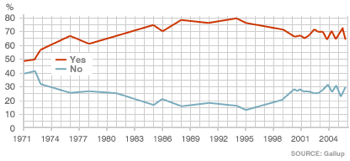
|
|
|
Friday 02 December 2005
Media
BBC Journalism Would you characterize the red line in this graph as indicating anything that’s ‘dwindling’?
To me, it seems to indicate something that’s been suffering from sampling errors since about 2003, but that is still within 10-15% of the peak it reached over ten years ago. With no obvious trend, it’s a stretch, at least, to characterize this as ‘dwindling’. (Actually, while I was writing this, they changed the headline twice — using various forms of ‘decline’ and ‘wane’.) But that’s what the BBC does, because what’s allegedly dwindling here is support for capital punishment in the United States. Personally, I am generally opposed to the death penalty, but not because I believe that people found guilty of the kinds of crimes that bring the death penalty in the United States have some humanity that should be cause for mercy. I’m troubled by this kind of penalty being meted out by a justice system run by people who are rewarded not for delivering actual justice, but for delivering convictions; and I’m even more troubled by the damage inflicted on our culture by this strange, passionless, clinical snuffing out of human life. I would be far more comfortable with a system that sentenced murderers to be beaten to death by relatives of their victims. But I don’t want to talk about that now; I’m not up to that much typing today, and it’s not as if there any shortage of opinion out there on the subject already. Instead, I want to talk about the BBC’s news coverage, and specifically about their strange use of quotation marks in headlines. I subscribe to the BBC’s RSS news feeds, and so all I see of many of their stories are the headlines. The thing that immediately jumps out at me is that they use a hell of a lot of quotation marks in their headlines; upon further examination, there doesn’t seem to be much logic behind it, either. Among today’s headlines, for instance, are these:
I can understand the use of quotes there: the ‘buoyancy’ or a market isn’t something that you can show with statistics; it’s an interpretation. ‘Sorry’ is presumably a direct quote. But in most situations, it’s just baffling. The BBC will write a story about something where the facts are not in dispute, and still put things in quotes:
The RIR story is about a statement from NIO minister Angela Smith, who said that members of the Royal Irish Regiment who face ‘compulsory redundancy’ i.e. getting ‘downsized’ can switch to a different job rather than being put out to pasture. The news here is that people will be permitted to switch jobs, not that someone says they ‘may switch jobs’. The divers in question were plundering shipwrecks. Julia Roberts has earned more, in U.S. dollars, than any other actress in the past year. The ‘insurgents’ fired mortars and rockets at US bases and government offices in Ramadi. So why the quotes? Most interesting are the situations in which they don’t use quotation marks:
So ‘treasure’ above needs to be quoted but ‘scam’ can stand on its own? ‘Snub’ isn’t a judgement? ‘Equality elusive for black Americans’? Is there some new standard scientific measure of ‘elusivity’ or even ‘equality’ that I’m unaware of? And you will note that the raid on Ramadi isn’t quoted, even though the characterization of the other side’s action (‘attack’, above) was. The problem with using quote marks all over the place ‘to’ underscore just how ‘impartial’ you ‘are’ is that when you do ‘not’ use them, as in ‘Equality elusive for black Americans’, their absence becomes an implicit declaration of absolute fact. Maybe this is the whole point. There’s nothing wrong with the three quote-mark-less headlines above; they would not be surprising from any news source in the world. If you constantly scare-quote plainly uncontroversial things, though (sky ‘blue’; water ‘wet’; ‘suicide bomber’ kills self by blowing up bomb; Franco still ‘dead’), then the absence of those quotes in something allows you to throw the weight of authority behind something that actually is controversial or open to question without print any actual falsehoods or resorting to the <blink> tag. Posted by tino at 13:39 2.12.05This entry's TrackBack URL::
http://tinotopia.com/cgi-bin/mt3/tinotopia-tb.pl/496 Links to weblogs that reference 'BBC Journalism' from Tinotopia. |
